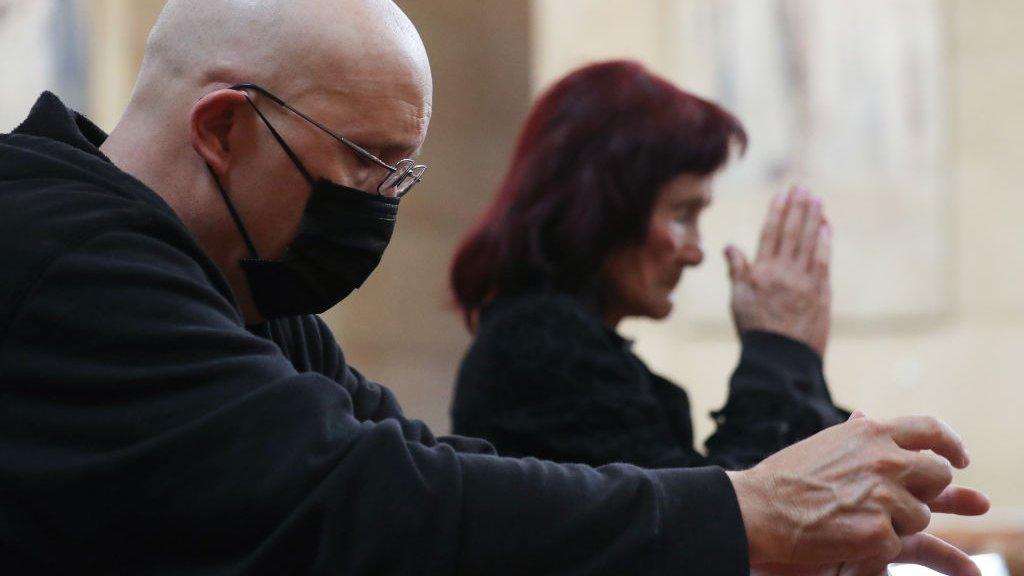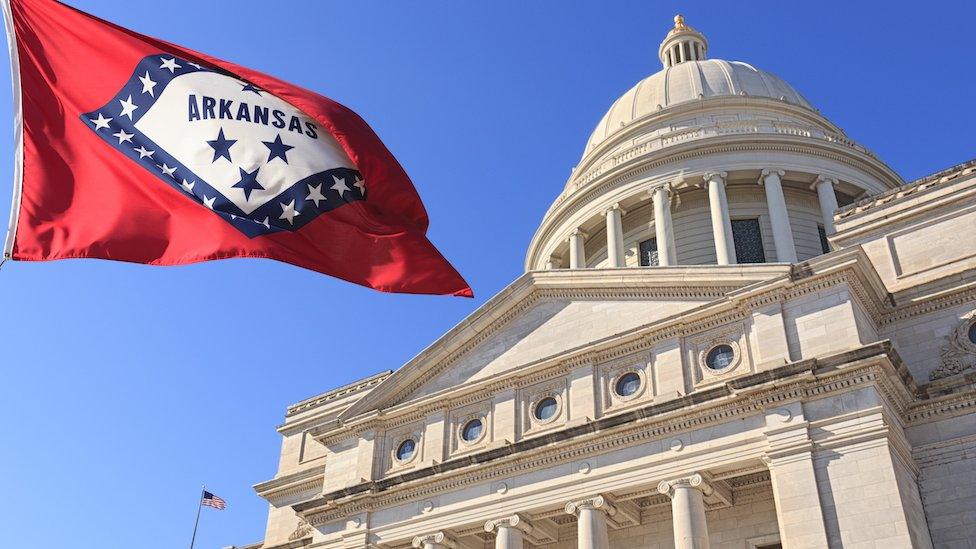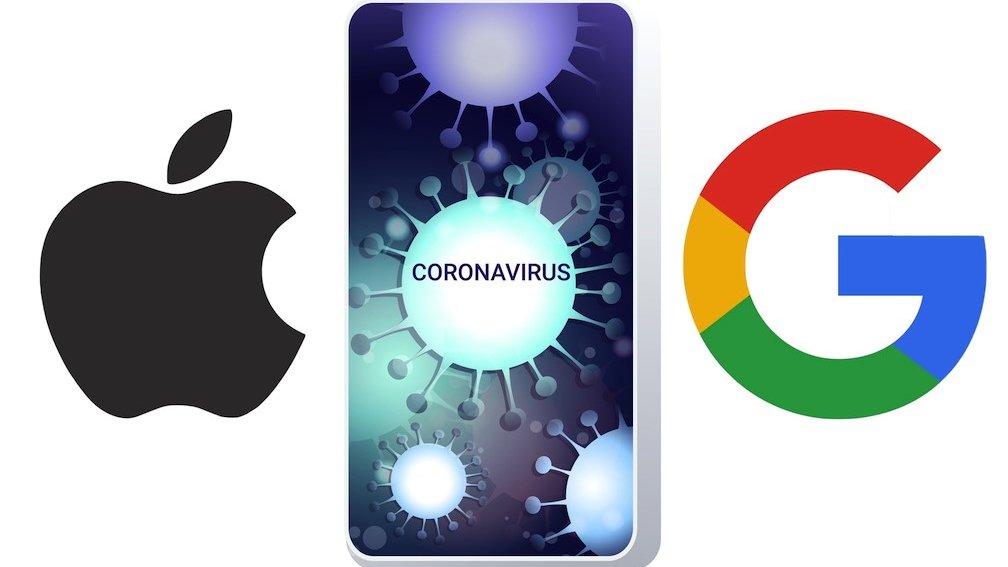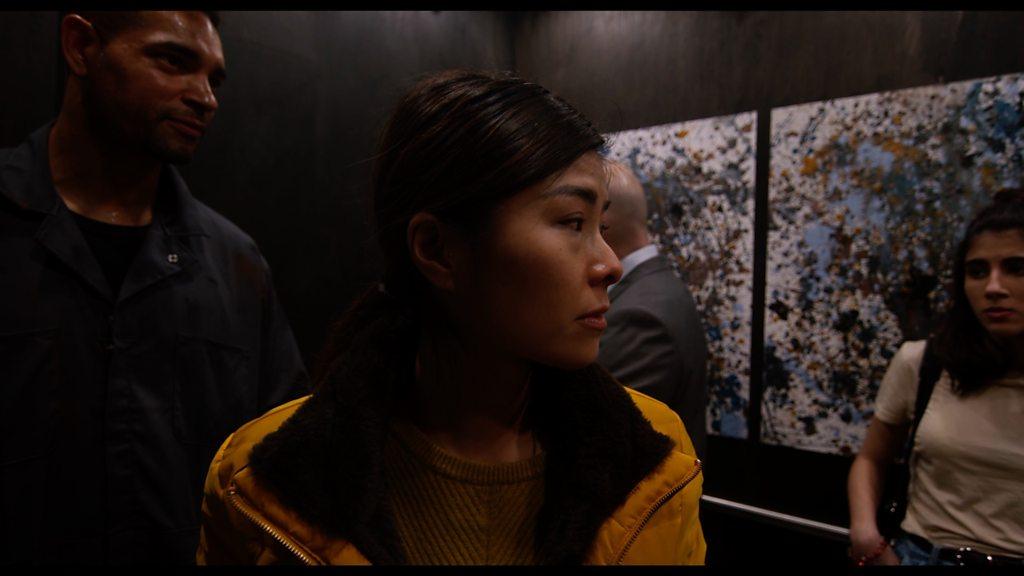Coronavirus: Trump feuds with governors over authority
- Published
Governor Andrew Cuomo: 'We don't have a king, we have a president'
New York Governor Andrew Cuomo accused President Donald Trump of "spoiling for a fight", as the US leader lashed out at "Democrat Governors".
Several states, including New York, have begun cautious talks on reopening, but Mr Trump has claimed he has "total" power to lift virus lockdowns.
Mr Cuomo refuted the claim on Tuesday as Mr Trump took to Twitter to criticise the governor.
The US is the epicentre of the pandemic with 592,743 cases and 25,239 deaths.
New York state has the most cases, with almost 190,000 cases and over 10,000 deaths. However, it has seen signs of improvement, with the number of people hospitalised due to coronavirus falling for the first time on Tuesday.
What's the row about?
On Monday, Mr Trump wrote on Twitter that deciding when to reopen states was "the decision of the president", not state governors, although he added that he would make his decision "in conjunction with governors".
The US Constitution says that states maintain public order and safety. So far, it has been individual state governors who have issued lockdown or shelter-in-place orders.
Also on Monday, several US state governors discussed plans to resume economic activity without apparent input from the Trump administration.
Ten states - seven on the East Coast, led by New York Governor Andrew Cuomo, and three on the West Coast, led by California Governor Gavin Newsom, said they would co-ordinate how to reopen businesses after the outbreak is contained. All but one of the states is led by a Democratic governor.
Now, a row has erupted over who has the ultimate authority to lift lockdown orders.
Who said what?
On Monday night, Mr Trump gave a combative press conference where he feuded with reporters, criticised their coverage of how he handled the outbreak, and said that when it came to reopening the economy, "the president of the United States calls the shots".
WATCH: Reporter challenges President Trump at briefing
"When somebody is the president of the United States, the authority is total," he said, adding: "They can't do anything without the approval of the president of the United States."
His position has been contradicted by governors and legal experts. It also contrasts with his earlier position that the responsibility for fighting the outbreak and order lockdowns lies primarily with state governors.
The row continued on Tuesday, as Mr Cuomo told CBS Mr Trump did not have total authority to decide when to reopen businesses, because "we don't have a king, we have a president".
During his daily press briefing, Mr Cuomo criticised Mr Trump, adding he would "not engage" in a fight with him, but would have "no choice" if the president the threatened the welfare of New Yorkers.
He added: "I put my hand out in total partnership and co-operation with the president."
Meanwhile, Mr Trump took the row to Twitter on Tuesday, criticising Mr Cuomo and issuing an oblique snipe at other governors.
"Tell the Democrat Governors that 'Mutiny On The Bounty" was one of my all time favourite movies," Mr Trump, a Republican, wrote.
"Dear Class of 2020": Graduating high school seniors' messages to their peers
"A good old fashioned mutiny every now and then is an exciting and invigorating thing to watch, especially when the mutineers need so much from the Captain." The tale tells of a ship's revolt in which mutineers meet with unhappy ends, with Mr Trump appearing to compare himself to the captain.
The president aimed particular fire at Mr Cuomo, who he said was calling "daily, even hourly, begging for everything," like hospitals, beds, ventilators for his state. New York remains the US state hardest-hit by the coronavirus outbreak, reporting 778 deaths in the past 24 hours.
However, Mr Trump struck a less combative tone later on Tuesday, saying he would make a decision on the economy "in conjunction with governors" soon.
"We have tremendous support from governors, and what I do is going to be done in conjunction with governors."
Olympic dreams dashed by a pandemic and politics 40 years apart - two swimmers talk about missing out
The Trump administration had previously signalled 1 May as a potential date for easing the restrictions.
The current White House recommendations for Americans to avoid restaurants and non-essential travel and keep in-person gatherings to no more than 10 people expire on 30 April.
However, the US's top infectious diseases adviser, Dr Anthony Fauci, told AP on Tuesday that the 1 May date might be "a bit overly optimistic".
Referring to testing and tracing procedures, he said: "We have to have something in place that is efficient and that we can rely on, and we're not there yet."

A SIMPLE GUIDE: How do I protect myself?
AVOIDING CONTACT: The rules on self-isolation and exercise
HOPE AND LOSS: Your coronavirus stories
VIDEO: The 20-second hand wash

What strategies are other countries taking?
Globally, different approaches have been adopted to loosening lockdown restrictions.
The Chinese province of Wuhan, where coronavirus was first reported last December, has partially reopened after more than two months of isolation.
Spain has allowed around 300,000 nonessential workers to return to their jobs.
Italy - the hardest-hit country in Europe - will allow a narrow range of businesses to resume operations this week.
In France, President Emmanuel Macron has announced the country's near-lockdown will extend until 11 May.
The UK government has said no one should expect any changes to its lockdown restrictions this week.
What else did Trump say?
Mr Trump told Monday's briefing he did not intend to fire Anthony Fauci - a day after the president shared a tweet with the hashtag "#firefauci".
Dr Fauci incurred the ire of the president's supporters after he told CNN that lives could have been saved if the US had shut down earlier during the coronavirus outbreak.
Mr Trump invited Dr Fauci - a key member of the White House coronavirus task force - to the stage in the opening minutes of the briefing.
The president said that he and Dr Fauci had been on the same page "from the beginning" and declared he liked the respected doctor.
"I think he's a wonderful guy," Mr Trump said, while adding that not everyone was happy with the health expert.
Dr Fauci has contradicted or corrected Mr Trump on scientific matters during the public health crisis. But on Monday, he conceded he had used "a poor choice of words" in his CNN interview.
While Mr Trump initially played down the threat of coronavirus, he was by no means alone among US public officials in doing so.
Dr Fauci himself on 17 February said the danger from coronavirus is "just minuscule" compared with the "real and present danger" of flu.
- Published10 April 2020

- Published9 April 2020

- Published10 April 2020

- Published9 April 2020
